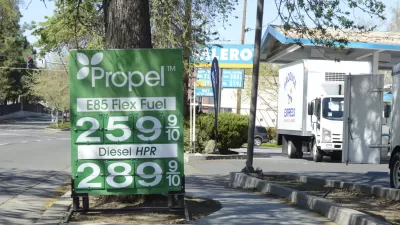Renewable diesel, a biofuel that differs from biodiesel by the feedstock used and its chemical makeup, making it indistinguishable from petrodiesel, is a small but growing industry. The announcement from UPS was welcome news for three companies.
"On (July 29), UPS plans to announce that it will buy as much as 46 million gallons of renewable diesel over the next three years, helping the company reach a goal of displacing 12 percent of the petroleum-based fuels in its ground fleet by 2017," writes Diane Cardwell, Business Day reporter for The New York Times.
The renewable fuels, from three suppliers [noted below], are chemically so close to their petroleum-based counterparts that they can replace them in engines and pipelines. They are made from an array of bio-based sources, including palm* and waste oils, and animal fats.
Renewable diesel is not biodiesel. Here's an explanation from Advanced Biofuels:
- Biodiesel is chemically different from petrodiesel and renewable diesel
- Renewable Diesel, often called “green diesel” or “second generation diesel,” refers to petrodiesel-like fuels derived from biological sources that are chemically not esters and thus distinct from biodiesel. Renewable diesel is chemically the same as petrodiesel, but it is made of recently living biomass
In addition, the feedstock need not be from edible crops. A 2013 study published in the Proceedings of the National Academies of Science found that "up to five percent of grasslands in some states are converted to cropland each year to grow corn and soybeans for ethanol and biodiesel." A 2009 report from the Environmental Defense Fund indicated that emissions from biofuels are undercounted.
"Unlike ethanol or other biofuels, said Mike Whitlatch, vice president for global energy and procurement at UPS, there are no limits on how much renewable diesel can be blended with conventional fuel, so building the market is 'purely a function of how many bio-refineries are built and how much renewable diesel they can produce,'” adds Cardwell.
The market for renewable diesel is much smaller than for biofuel and ethanol — a little more than a billion gallons is produced each year, said Victor Oh, an analyst at Lux Research. But the market is growing faster, he said, and is expected to reach 1.6 billion gallons in the next three years, largely driven by demands for renewable jet fuel.
UPS will purchase renewable diesel from three sources:
- Neste, a Finnish company that is the leading producer of renewable diesel, "including more than half from waste and residues," notes the UPS press release.
- Renewable Energy Group, based in Ames, Iowa, "produces renewable hydrocarbon diesel fuel from waste vegetable oils and animal fats at its Geismar, Louisiana, bio-refinery as well as biodiesel at nine bio refining locations in the U.S.", per press release.
- Solazyme, based in South San Francisco, Calif. which makes an algae-derived oil that is refined into renewable diesel.
Hat tip to Bill Magavern, Policy Director, Coalition for Clean Air.
FULL STORY: UPS Agrees to Buy 46 Million Gallons of Renewable Diesel

Alabama: Trump Terminates Settlements for Black Communities Harmed By Raw Sewage
Trump deemed the landmark civil rights agreement “illegal DEI and environmental justice policy.”

Study: Maui’s Plan to Convert Vacation Rentals to Long-Term Housing Could Cause Nearly $1 Billion Economic Loss
The plan would reduce visitor accommodation by 25% resulting in 1,900 jobs lost.

Planetizen Federal Action Tracker
A weekly monitor of how Trump’s orders and actions are impacting planners and planning in America.

Wind Energy on the Rise Despite Federal Policy Reversal
The Trump administration is revoking federal support for renewable energy, but demand for new projects continues unabated.

Passengers Flock to Caltrain After Electrification
The new electric trains are running faster and more reliably, leading to strong ridership growth on the Bay Area rail system.

Texas Churches Rally Behind ‘Yes in God’s Back Yard’ Legislation
Religious leaders want the state to reduce zoning regulations to streamline leasing church-owned land to housing developers.
Urban Design for Planners 1: Software Tools
This six-course series explores essential urban design concepts using open source software and equips planners with the tools they need to participate fully in the urban design process.
Planning for Universal Design
Learn the tools for implementing Universal Design in planning regulations.
Caltrans
Smith Gee Studio
Institute for Housing and Urban Development Studies (IHS)
City of Grandview
Harvard GSD Executive Education
Toledo-Lucas County Plan Commissions
Salt Lake City
NYU Wagner Graduate School of Public Service




























